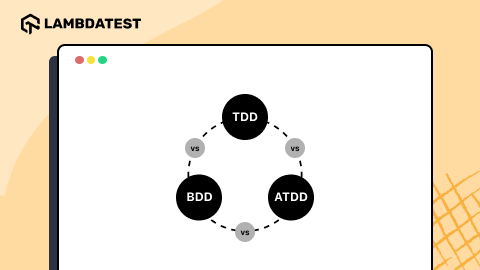Automating Testing: A Backbone To DevOps
Deeksha Agarwal
Posted On: October 8, 2017
![]() 18251 Views
18251 Views
![]() 5 Min Read
5 Min Read
There are two wheels in any software development organization: Development and Operations. They both go hand in hand and for the smooth running of both processes, it’s necessary that they run in complete sync and co-ordination. Now to ensure that there is no lingering between operation and software development processes like design, build, test, and deployment, all these teams have to be on the same page in terms of speed and integration. So all these development processes must attune.
Software testing, if not done efficiently, can be the biggest hindrance in the smooth running of any organization. For large and fast development operations and to make sure that the testing team does not lag behind it becomes imperative to implement Automation Testing.

So why automation testing?
Automation testing, as the name suggests, means to automate a process and involves less of human intervention. So, why we use automation testing? The main reasons are-
- Time-saving: Since it employs the use of test case to detect bugs in the software program, it is less time consuming as compared to other testing methods. If the testing is made faster, then the deployment frequency of the product in the market can increase to an enormous level.
- Less prone to errors: As this involves the use of software program to test the application so the chances of human errors are minimized. Manual effort is required to generate the test case and to command it to execute the testing process. So various sorts of human errors are eliminated to a great extent.
- Repeated execution: When you need to execute the test case for an ample number of times so as to check the validity of the application then Automation testing can prove to be a boon. Since it consumes less time so repeated execution becomes easy.
- Reliable: When we automate any application or process, the reliability is automatically increased to many folds. The major reason being less human errors.
How Automation Testing helps DevOps?
During the time when waterfall development processes were dominating all other development methods, all the different teams in an organization used to work independently. In waterfall technology, all the teams are laser-focused on their part.
- Planning team plans the line of action
- Defining team defines the various requirements and tools necessary to carry out that action
- Then Production team builds the product according to the specifications
- After building, the testing team performs the tests on the product to validate if it is meeting the requirements or not.
- Then finally the product is deployed in the market for service.
This creates a lot of problems between the teams when it comes to finding a solution to some bug introduced at a certain phase. And it is next to impossible to locate at what stage the bug was introduced. But ultimately the main problem was that release to market in this development cycle was extremely slow. In an era where competitors release new features every other month, this methodology fails to give an edge.
This is where Agile technology came into existence. Agile technology follows the process of continuous development, continuous integration, and continuous deployment. In this technology, the product goes through different build cycles. Each build cycle includes production, testing, and feedback. This accounts for the need of DevOps.
In DevOps, Development and Operations teams work together to achieve the target. Since the product is tested at every build cycle so the testing needs to be in pace with the development process to avoid any hassle between the teams. DevOps can not succeed if the tests are performed manually as they consume a lot of time. So, here automation testing plays a major role. Automating a testing process decreases the time required for testing an application and it providessupport to the DevOps culture. Without automation testing, it becomes almost impossible to practice DevOps.
When DevOps and automation testing work concurrently the following problems are eliminated:
- Silos among the teams: Working together eliminates the differences among the teams and creates an atmosphere of understanding in the organization.
- Delayed product deployment: Understanding between the teams increases the speed of product development and troubleshooting problems. As a result, the speed of product deployment increases.
- Slower Release to market: If the product will be deployed at a higher frequency, then the problem of slower release to market will no longer exist.
- High failure rate of new releases: When testing methods are automated and product is developed and tested in collaborative environment then the failure rate of new product releases will be decreased to a great extent.
Conclusion
In a nutshell, we can say that Automation Testing is a backbone to DevOps and it becomes impossible to implement DevOps culture without the help of Automation Testing. When practiced together in an organization, they can help to attain new heights of success.
Got Questions? Drop them on LambdaTest Community. Visit now












